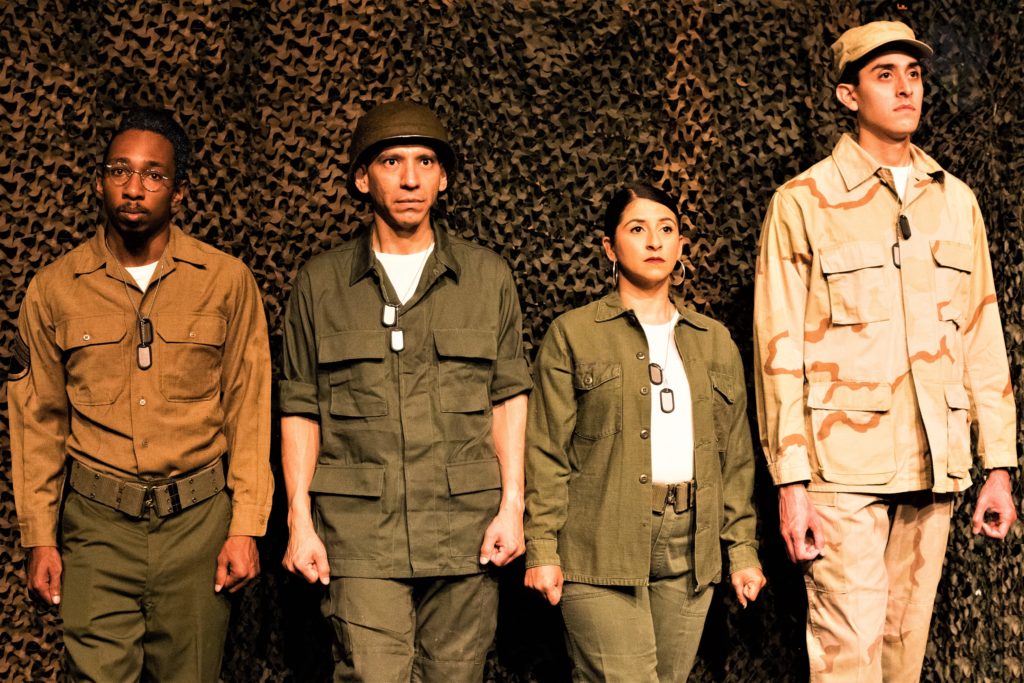“Elliot-A Soldier’s Fugue” Looks at 3 Generations of Combat Veterans
By JASMINA WELLINGHOFF, Editor –
“Hudes writes at the intersection of music and drama,” said the Los Angeles Times in an article about Quiara Alegria Hudes, the author of Elliot- A Soldier’s Fugue, a Pulitzer Prize nominated play that will have its San Antonio premiere at the Classic Theater of San Antonio this weekend. What a poetic way to describe playwriting and generate curiosity! The play is presented as part of the Classic’s Second Series devoted to smaller productions.

Judging from press reports and our interviews, it may be smaller and cheaper to stage, but the four-person drama packs a considerable emotional and intellectual punch. The play focuses on three generations of military men from a Puerto Rican family, who, respectively, served in Korea, Vietnam and Iraq. The title character, Elliot, is the youngest one who fought in Iraq where he sustained a serious injury. Each man deals with his war experiences in his own way, and the play interweaves their voices the way musical themes are stated, repeated and responded to in a fugue, hence the title.
Coming from a military family, the Classic’s executive-artistic director, Kelly Roush, said she was “very moved” after reading the work. And the fact that the playwright is a woman and “a woman of color,” fit nicely with the company’s interest in presenting a wide range of viewpoints. Roush eventually recruited Ana Olivo Funes, who teaches theater at Jefferson High School, to direct the play. She, too, is from a military family, and, like Roush, was affected by the play and “drawn to it.”

“I was drawn by the lyrical nature of the text,” she said. “Also, coming from a military family, I connected to the play in that way, too.”
As a child, Funes moved with her family to wherever her father was posted, and although she never witnessed anything horrible, she did have some disturbing brushes with violence. At one point, in the 1980s, they were living in Greece when the country’s leftist government voted to close American bases. It was also just after the U.S. had bombed Libya, provoking some local anger in Greece. “There were bomb threats around the places where military people used to hang out,” she said. “Military life touches every family member.”
Another aspect of Elliot that appealed to herwas its structure, which doesn’t follow the traditional linear time progression. “In the first scene we see Elliot going to Iraq but in the following scene he is already back from Iraq,” she explained. “In the third scene, Pop, Elliot’s father, is writing a letter to his father from Vietnam…Sometimes characters speak for one another. They have long monologues; they never speak to each other in real time”
This unconventional structure inspired her to approach her directing job using techniques such as the Suzuki method and a similar approach called Viewpoints, which emphasize the physicality of performance. As she explained, it’s the reverse of what is usually done in Western theater. Instead of the inside-out method (actors expressing thoughts and feelings mostly verbally), these training methods emphasize the outside-in, in other words movement, gesture and physical interaction as means of expression. Inevitably, directing has to incorporate elements of choreography as stage action must be spatially coordinated. Fortunately, two cast members have dance experience and a third is a martial art practitioner.
“This approach works very well with this play,” said the director. “And it helps tell the audience who is who in a specific scene.”
In addition to the three men, portrayed by Adam Ochoa (Elliot), Steven J. Tugman (Pop) and Luis Garcia Jr. (Grandpop) – there is also the lone female character, Ginny, Elliot’s mother and Pop’s wife (Keli Rosa Cabunoc Romero) who is the nurturer of the family, said Funes, though she, too, was part of the military as a nurse.
The play offers no feel-good resolution. Despite Elliot’s efforts to connect with his father, Pop refuses to go into any deep confidences, preferring to tell pleasant stories about distributing candy to kids in the war zone, and other similar anecdotes. Ultimately, the play is not about war and the military per se, noted Funes. “It’s about the impact war experiences have on the family,” she said.
Elliot is the first part of a trilogy of plays that have won huge accolades for the playwright, including a Pulitzer for the second play Water by the Spoonful. The third and final part, The Happiest Song Plays Last, revisits Elliot’s life ten years after his return from Iraq. Let’s hope, San Antonio will get a chance to see all three.
Elliot – A Soldier’s Fugue, Oct.18-Oct.27, Fridays-Saturdays 8 p.m., Sundays 3 p.m.; Classic Theater of San Antonio, 1924 Fredericksburg Rd., 78201; tickets $25; call box office 210-589-8450
